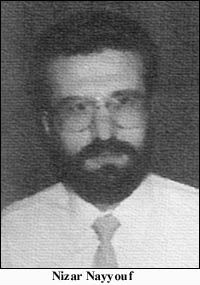 |
| Vol. 3 No. 5 | Table of Contents MEIB Main Page | May 2001 |
| | Nizar Nayyouf Syrian Journalist |
by Marina Chamma
 |
Prior to his arrest on January 5, 1992, Nayyouf was a journalist with the monthly Sawt al-Dimuqratiya and a regular contributor to the magazines Al-Hurriya and Al-Ma'arifa. Most importantly, he was a founding member of a new human rights organization, the Committee for the Defense of Democratic Freedom and Human Rights (CDF), which had been banned by the Syrian government shortly after its establishment. Nayyouf was the main driving force behind the CDF and insisted that it remain an independent organization, unaligned with any of the authorized or unauthorized political groups existing at the time.
In December 1991, CDF activists allegedly distributed leaflets criticizing irregularities in the "reelection" of President Hafez Assad earlier in the month, a rather audacious move in a police state where the slightest displays of dissent are not tolerated. In response, Syrian security forces began a massive nationwide crackdown on the CDF, rounding up its activists, supporters and their families. Nayyouf went into hiding, but security forces arrested his wife and baby daughter in order to force him to surrender. Subsequently, in February-March 1992, he and 17 other suspected CDF activists were tried by the Supreme State Security Court on charges of membership in an illegal organization, receiving money from abroad, and disseminating false information.
Human rights organizations such as Amnesty International and Human Rights Watch agree that the trial of Nayyouf and his colleagues was "grossly" unfair by internationally recognized judicial standards. In a 1998 report on Nayyouf, Human Rights Watch noted: "Defense attorneys were not permitted to meet with their clients prior to the proceedings or introduce evidence on their behalf. The defendants complaints about torture under interrogation were ignored by the judges. The convictions and sentences were not reviewed by a higher tribunal, as required under international law."1
Nayyouf was sentenced to ten years in prison with hard labor, while 12 others received lesser prison sentences of three years or more. During the course of his detention, Nayyouf was hung upside down and beaten with an iron pipe, and tortured on the "German chair" (a metal chair with moving parts, which causes acute hyperextension of the spine and severe pressure on the victim's neck and limbs). As a result of the wretched conditions and mistreatment to which he was subjected, he developed lymphoma (a malignant tumor of the glands), eye infections and a ruptured vertebra. His lower limbs are now paralyzed and he can no longer walk without crutches.
Amnesty International and Human Rights Watch actively campaigned for his release, as did media groups such as Reporters sans frontières (RSF), the World Association of Newspapers and the Committee to Protect Journalists. These initiatives intensified amid reports of his deteriorating health during the late 1990's. In recognition of his efforts to promote freedom of speech in Syria, Nayyouf received the Freedom-to-Write award from PEN American Center, the 2000 UNESCO international press freedom prize, and other awards.
In April 2000, the Syrian regime offered to transfer Nayyouf from the notorious Mezze prison to a medical facility on the condition that he disavow his views and return the prizes awarded to him by international NGO's. When he refused, he was taken back to Mezze prison and placed in solitary confinement. In late 2000, the Syrian regime increased the pressure on Nayyouf by prohibiting his family from visiting him, to which he responded with a 20-day hunger strike. Fearing the negative publicity that would ensue from the death of Syria's most well-known political prisoner, the government reversed the decision.
On April 24, Nayyouf began another hunger strike, pledging to continue it until he was released without preconditions. On May 6, the Syrian government finally relented (apparently upon learning that Pope John Paul II was carrying a message from RSF to President Assad concerning Nayyouf's imprisonment).and brought him to his house in the coastal city of Lattakia. However, he was placed under house arrest and prevented from leaving the country to seek appropriate medical care. "I would like to be hospitalized in France or Germany," he told RSF from his Lattakia home after his release.2 In response, the French Ministry of Foreign Affairs praised Nayyouf's release, but declined to comment on whether France would be willing to receive him for medical treatment.3
In a telephone interview from his home, Nayyouf said that his release was a result of "international pressure on Syria."4 This led the Syrian authorities to cut his telephone lines, but they were restored two days later after RSF publicly condemned the measure.
Notes
1 Human Rights Watch press release, 18 September 1998.
2 Reporters sans frontières press release, 7 May 2001.
3 L'Orient-Le Jour (Beirut), 10 May 2001.
4 Al-Nahar (Beirut), 8 May 2001.